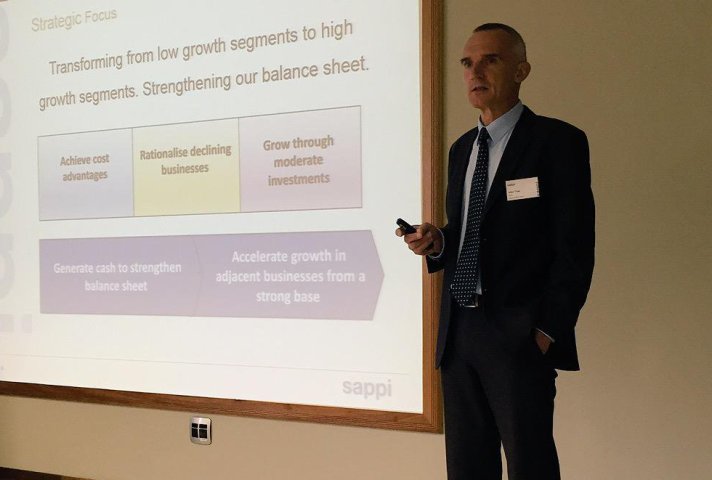South Africa still a good place to do business
Sappi Limited, a leading global producer of dissolving wood pulp, specialties and packaging papers, printing and writing papers and biomaterials, is one of the companies that had committed investments that will contribute towards job creation and training opportunities.

- Country:
- South Africa
The second installment of the South African Investment Conference has proved that the country is still an attractive investment destination - having amassed a total value of investment commitments of up to R363 billion.
This was 17% higher than the R300 billion in investments made at the inaugural conference last year, where President Cyril Ramaphosa announced his intention to raise $100 million – or R1.2 trillion – in new investments over five years with a view to address low economic growth and reduce unemployment.
Sappi Limited, a leading global producer of dissolving wood pulp, specialties and packaging papers, printing and writing papers and biomaterials, is one of the companies that had committed investments that will contribute towards job creation and training opportunities.
At this year’s investment conference, the company committed an R14 billion investment on its various plants across the country. The funds will be spent over a five-year-period on maintenance, expanding capacity, investing in new products and improving the company’s environmental footprint.
This investment was above the R7.7 billion investment made at its Saiccor Mill in Umkomaas, KwaZulu-Natal, announced at the inaugural South African Investment Conference, last year.
Sappi Southern Africa CEO Alex Thiel believes that South Africa is still a good place to do business.
“We have good skills. We have great raw materials and the ports in Durban are well-positioned to serve the Asian markets which are growing at 6% a year. We have quite a good and profitable business in South Africa and business like that needs continuous investments to remain competitive in the market,” he told SAnews during an interview.
In the long-term, the R7.7 billion investment is expected to create about 200 jobs and about 2 000 jobs will be created during the construction phase.
Business benefits from R14 billion investment
Contractors and sub-contracts from big companies as well as Small, Medium and Micro Enterprises (SMMEs) are set to benefit from the R14 billion investment as they will be employed to do work which will help them sustain their businesses during these tough economic times.
They will be providing cleaning services, maintenance work and building new equipment.
A large percentage of the investment will go towards equipment that is made in South Africa and services that will be procured such as fitters, welders, and artisans.
“All this investment is spent to either manufacture equipment in South Africa and that creates jobs for our contractors and sub-contractors or it goes to providing services such as cleaning turbines, building scaffolding and rewinding electric motors,” Thiel said.
The funds will also go towards expanding capacity at the company’s container cardboard business.
“We supply the material that is used to make the boxes, which is mainly focused on fruit export. That is a massive business that requires more of our products as the market grows,” Thiel said.
Sappi is also looking at investing in new products that are derived from a tree.
“Whatever you can make as an oil-based product, you can also make from a tree-based product. We are looking at extracting more sugars out of our processes, stuff like xylitol which at the moment is imported from the US and China,” he said.
With the introduction of the carbon dioxide (CO2) tax and the air emission standards and water emission standards becoming tighter and tighter, Sappi will spend money improving its processes to make the company environmentally sustainable.
“We generate quite a lot of electricity and steam and some of that investment will go into making those processes greener. They are currently at 50% - 60% green - but we are trying to make them more green and in that process produce less CO2,” he said.
Expanding capacity
Sappi’s R7.7 billion investment will be spent to expand capacity at its Saiccor Mill in Umkomaas.
“We are expanding our capacity at Umkomaas mill by 15%. It currently produces 780 000 tons a year, and this will go up to 890 000 tons per year. We are increasing our wood yard so the capability of getting timber for the process into the mill, that’s completed. That was about 10% of the R7.7 billion,” Thiel said.
The funds will also go towards installing a new recovery boiler which improves the company’s environmental footprint.
Sappi has already recruited nearly 100 young people that will be running the plant and they are currently receiving training.
(With Inputs from South African Government Press Release)
ALSO READ
Unified Brainz Group Celebrates Milestones with 6th Global Business Leadership Forum & Awards 2024
Global Leading Metal Shaping Equipment Maker HSG Strengthens Business Expansion in India
BRIEF-Aviva Completes Acquisition Of AIG's UK Protection Business
Goa businessman arrested following explosion at his cashew farm; forensic team dispatched to investigate
Business rivalry: Condoms, gutkha, stones found in samosas supplied to auto firm; five booked










